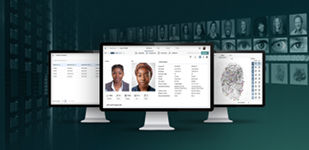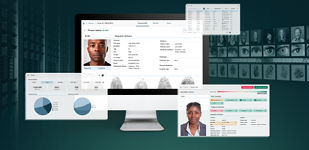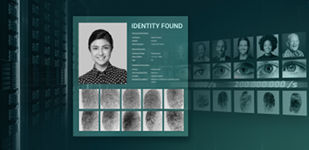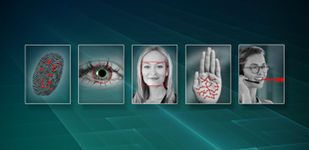National identity register solutions
Protect identity and keep fraudsters at bay
Neurotechnology offers biometric solutions for accurate and reliable civil identification based on fingerprint, palmprint, face, and iris recognition.
For civil identity documents like passports, national ID cards, driver's licenses, health insurance cards, etc., our system provides failsafe protection. Even in the absence of an ID, the solution supports recognizing people merely based on their fingerprints and/or faces.
- We have been in the lead for the best fingerprint identification in terms of both speed and accuracy in the NIST algorithmic challenge for many years.
- In 2020, NIST ranked our iris recognition algorithm as the second most accurate.
- The five most accurate candidates as determined by NIST in 2019 were compared to our technique for matching palm prints, which was found to be both the fastest and most accurate overall.
- In both 1:1 verification and 1:N identification scenarios, Neurotechnology's most recent facial recognition algorithm placed among the best algorithms.
References and case studies
The case studies and solution partner references are prepared using the information from our customers about their software based on our biometric technology. Each case study wording is approved by the corresponding customers:
-
Ukraine's National Biometric Verification and Identification System is based on MegaMatcher Accelerator solution and MegaMatcher technology.
The National Biometric Verification and Identification System of Ukraine is intended for creating a data bank with Ukrainian citizens biometric information. Talan Systems has developed the solution using the MegaMatcher SDK with MegaMatcher Acclelerator units. At the moment there are 12 million people already enrolled into the system, which is capable to enroll up to 30,000 people per day, as well as serve identification requests in under 4 seconds.
See the Solution Partner reference. -
Madagascar ID credential issue project uses MegaMatcher ABIS solution.
The Madagascar Ministry of Digital Development, Digital Transformation, Posts and Telecommunications (MNDPT) has partnered with MOSIP to implement a pilot program for ID credential issuance. Neurotechnology's MegaMatcher ABIS has been chosen for use in the pilot as a turn-key MOSIP-compliant solution. The pilot will show an end-to-end demonstration of MOSIP, covering some registrations and ID generation.
Read the press release. -
Mexico Multi-Biometric Enrollment System is based on MegaMatcher technology and MegaMatcher Accelerator solution.
Mexico's tax collection agency required a fast and accurate biometric system for their digital identification and certification system. Vangent Mexico business unit and Biometria Aplicada have implemented the Multi-Biometric Enrollment System (MBES®) for high-volume iris, face and fingerprint identification. More than 3.5 million taxpayers have been enrolled in the system with a goal of 5 million to be enrolled by 2014.
Read the case study (PDF). -
Somaliland National ID Project uses three biometric modalities and is based on MegaMatcher technology and MegaMatcher Accelerator solution.
Somaliland government decided to register all Somaliland citizens for the creation of a biometric National Identity Card system. Sahal Tech Solutions selected MegaMatcher Accelerator to provide the high level of security, accuracy and speed required for biometric registration and identification using fingerprint, face and iris biometrics. Biometric registration centers have been set up in every city and village in the country and almost 500,000 registrations were completed during the first months.
Read the case study (PDF). -
Indonesia Biometric Passport System is based on MegaMatcher multi-biometric technology.
Indonesia has updated their passport issuance system, increasing the speed and accuracy of document preparation, verification and delivery. X/LINK Software has developed a distributed passport issuance system with a centralized biometric matching component. After evaluating a number of biometric systems, X/LINK determined that Neurotechnology's MegaMatcher provided the best combination of high degree of accuracy, identification of duplicate registrations, exemplary technical support and a low total cost of ownership.
Read the case study (PDF). -
Poland Biometric Passport System is based on VeriFinger fingerprint recognition technology.
Polish Security Printing Works, working closely with the Polish government selected Neurotechnology's VeriFinger fingerprint recognition technology to be the verification engine for all newly issued passports. The VeriFinger-based fingerprint system was implemented as a part of the biometric data capture in all 130 passport offices throughout Poland. High performance and flexible licensing options enabled Polish Security Printing Works to quickly obtain, develop and implement the technology.
Read the case study (PDF). -
Bosnia and Herzegovina Biometric Passport and ID System is based on MegaMatcher technology.
IDDEEA (the Agency for Identification Documents, Registers and Data Exchange) developed the biometric identification system in-house using the MegaMatcher Extended SDK. The system, which was launched in October 2009, uses MegaMatcher components and ensures quality and accuracy required to meet European Union standards. The IDDEEA is an administrative organization within the Ministry of Civil Affairs of Bosnia and Herzegovina and is responsible for the personalization and technical processing of passports, identity cards, driving licenses and other identification documents for the nation's more than 4.6 million people.
Read the case study (PDF). -
El Salvador's National Passport System is based on MegaMatcher multi-biometric technology.
General Security El Salvador selected MegaMatcher to provide the core multi-biometric functionality for the Republic of El Salvador's first nationwide multi-biometric passport and immigration system. National-level AFIS and multi-biometric identification systems help governments provide a higher level of security for their citizens, visitors and trade partners in the global economy. A strategic approach to implementation is enabling El Salvador to develop a robust national database with immediate applications for immigration and criminal justice.
Read the case study (PDF). - Djibouti social register system makes use of tri-modal biometric person recognition. Fingerprint, face and iris identification engines from MegaMatcher SDK ensure accurate checking of registered persons and prevent fraud. Read more.
- Government of Gujarat (MA Yojana), Tata Steel and L&T Hazira in India use MegaMatcher-based solutions for attendance recording and contract labour identity management. Read more.
Products
Neurotechnology offers these biometric products for national ID applications:

Automated Biometric Identification System
Turnkey on-premise solution for national-scale multi-biometric identification projects.

Identity Management System
Comprehensive solution in a single, streamlined package for civil and criminal applications.

Identity Registration System
Ready-to-use, customizable solution for fast, accurate, and reliable biometric data capturing.

Solution for large-scale AFIS or multi-biometric systems. Provides high-performance biometric template matching on server-side.

Designed for development of large-scale single- or multi-biometric fingerprint, iris, face, voice or palmprint identification products.

